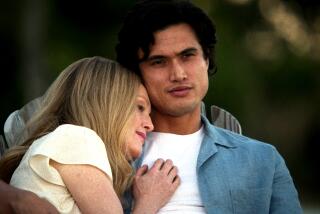A Darkly Strange Story Emerges in ‘Mr. Death’
- Share via
The less you know about the subject of Errol Morris’ latest documentary, “Mr. Death: The Rise and Fall of Fred A. Leuchter, Jr.,” the more startling the impact.
As a chronicler of bizarre Americana without peer, Morris seems to have found the ideal subject in Leuchter, who tells us how his concern for humane execution led to a career in improving electric chairs and gas chambers in America’s state prisons. Leuchter, who reveals no interest in the debate over the death penalty, is a voluble, middle-aged man with big glasses, a pronounced New England accent and an anonymous, nerdy demeanor. He seems to fit right in with the operators of pet cemeteries and assorted oddballs who have intrigued Morris over the past 20 years.
As we watch this film with the fascination combined with a sense of creepiness that is Morris’ calling card, we are completely unprepared by the tack the film suddenly takes. When Ernst Zundel, a Canadian neo-Nazi, was on trial in 1988 for publishing two books, “Did Six Million Really Die?” and “The Hitler We Loved and Why,” he was advised to send a gas chamber expert to Auschwitz on a fact-finding mission. He came across Leuchter, and off he went to Poland, combining research--with his honeymoon. Zundel sent a film crew--their footage is included in “Mr. Death”--along with Leuchter to show him taking measurements and illegally chipping away at the remnants and ruins of Auschwitz and its Birkenau annex.
*
Smuggling the fragments out with bags of dirty laundry, Leuchter returned home to Malden, Mass., where he submitted them to a laboratory chemist, James Roth, without telling him where the fragments came from or what the purpose of the testing would be. Roth discovered significant levels of cyanide in specimens from the concentration camp’s delousing building but little or no traces in bricks from the crematoria. In a flash, Leuchter became the darling of the Holocaust denial movement.
Leuchter became an extreme example of the human capacity to believe what you want to believe. Roth bluntly states that he was essentially asked to perform the wrong tests and details why they do not support Leuchter’s contention. For example, Auschwitz’s delousing building remains intact, while its crematoria were dynamited by the Germans as the defeat of the Third Reich became imminent, with the ruins Leuchter tested exposed to the elements for more than four decades before he arrived to chip away at them.
A history major at Boston University, Leuchter, his scientific and engineering skills self-proclaimed, never bothered to study the Auschwitz archives. The more the neo-Nazis embraced Leuchter, the more publicity he received, and the more resoundingly discredited he became, his career and marriage destroyed. (Faced with business reverses, Leuchter actually took out this classified ad: “EXECUTION DEVICE. Control module for lethal injection machine. Being sold for nonpayment. $10,000.”)
Eventually, Morris tracked down Leuchter in California. Leuchter insists he’s a reluctant revisionist and not anti-Semitic but clings steadfastly to his belief in the validity of the study he made of Auschwitz. With his elegantly elliptical style and mordant tone, Morris trusts us to appreciate for ourselves the way in which irony compounds irony within Leuchter and his fate, and how his capacity for denial in regard to the quality of his own “scientific” endeavors connects to the larger question of the denial that the Holocaust ever happened.
Zundel describes Leuchter as “a mouse of a man” who is “totally sincere, a total innocent,” and you come away from “Mr. Death” suspecting that Zundel is probably right in his appraisal. Morris once told reporter Mark Singer that what interests him is that “anybody can think he’s a hero,” which cuts to what Singer calls an important Morris principle: “We never truly know what we presume we know.” Thus, “Mr. Death,” which is shot through with one dark absurdity after another, emerges as a cautionary tale if ever there was one.
* MPAA rating: PG-13, for thematic elements. Times guidelines: detailed discussion of methods of legal executions and the working of Third Reich crematoria hardly suitable for small children, but appropriate for exceptionally mature adolescents.
‘Mr. Death: The Rise and Fall of Fred A. Leuchter, Jr.’
A Lions Gate Films release. Director Errol Morris. Producers Michael Williams, David Collins and Dorothy Aufiero. Executive producers Jonathan Sehring, Caroline Kaplan and John Sloss. Cinematographer Peter Donohue. Editor Karen Schmeer. Music Caleb Sampson. Production designer Ted Bafaloukos. Running time: 1 hour, 34 minutes.
Exclusively at the Nuart, 11272 Santa Monica Blvd., West Los Angeles, (310) 478-6379.
More to Read
Only good movies
Get the Indie Focus newsletter, Mark Olsen's weekly guide to the world of cinema.
You may occasionally receive promotional content from the Los Angeles Times.










